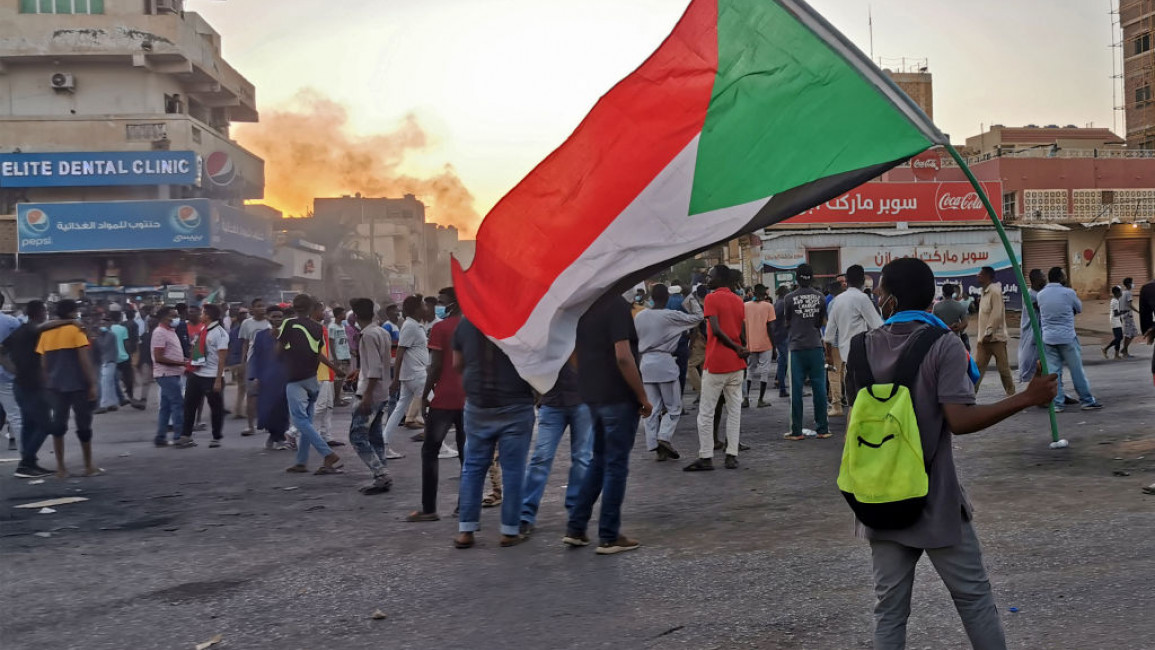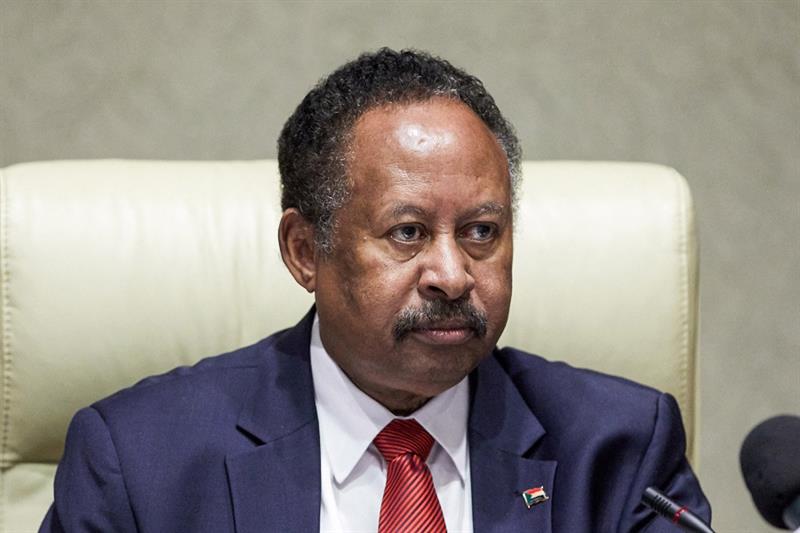The New Arab Staff & Agencies
20 November, 2021

Protests erupted in Sudan following a military coup at the end of October [Getty]
The death toll in Sudan from anti-coup protests since last month's military takeover has risen to at least 40, medics said Saturday after a teenager shot in the head days earlier died.
Sudan's top general Abdel Fattah al-Burhan on 25 October declared a state of emergency, ousted the government and detained the civilian leadership.
The military takeover upended a two-year transition to civilian rule, drew wide international condemnation and punitive measures, as well as provoking people to take to the streets.
Protests on Wednesday provoked the deadliest day so far, with the toll of those killed now standing at 16, according to medics.
"One martyr passed away... after he succumbed to severe wounds after being hit by live rounds to the head and the leg on 17 November," the independent Central Committee of Sudanese Doctors said. He was aged 16, it added.
Most of those killed on Wednesday were in North Khartoum, which lies across the Nile river from the capital, medics said.
Police officials deny using any live ammunition and insist they have used "minimum force" to disperse the protests. They have recorded only one death, among demonstrators in North Khartoum.
'Abuses and violations'
On Friday, small groups of protesters rallied in several neighbourhoods after prayers against the military coup, especially in North Khartoum, where people were seen building barricades across the roads. Security forces sporadically fired teargas to disperse them.
The United States on Friday condemned the deadly crackdown.
"We call for those responsible for human rights abuses and violations, including the excessive use of force against peaceful protesters, to be held accountable," State Department spokesman Ned Price said in a statement.
Washington said Sudanese should "be free to voice their opinions without fear of violence", and called for those arrested since the takeover to be freed.
"In advance of upcoming protests, we call on Sudanese authorities to use restraint and allow peaceful demonstrations," the US added.
Internet shutdowns are being weaponised by Sudan's regime
Perspectives
Jillian C. York
The Sudanese Professionals Association (SPA) have urged protesters to keep up their campaign, reporting Friday that security forces had "stormed homes and mosques" in North Khartoum.
The SPA is an umbrella of unions which were instrumental in the months-long demonstrations that ousted president Omar al-Bashir in April 2019.
Sudan has a long history of military coups, enjoying only rare interludes of democratic rule since independence in 1956.
Burhan, the top general, insists the military's move "was not a coup" but a step "to rectify the transition" as factional infighting and splits deepened between civilians and the military under the now-deposed government.
He has since announced a new civilian-military ruling council in which he kept his position as head, along with a powerful paramilitary commander, three senior military figures, three ex-rebel leaders and one civilian.
But the other four civilian members were replaced with lesser known figures.
Sudan PM Hamdok to return to lead government after deal with General Burhan: Report
AFP , Sunday 21 Nov 2021
Sudan's General Abdel-Fattah al-Burhan and Prime Minister Abdalla Hamdok have reached a deal for his return and the release the civilian leadership detained since last month's military takeover, mediators said Sunday.

Burhan on October 25 declared a state of emergency, ousted the government and detained the civilian leadership.
Related
The military takeover upended a two-year transition to civilian rule, drew international condemnation and punitive measures, and provoked large protests.
A group Sudanese mediators -- including academics, journalists and politicians -- who have been locked in talks to mediate a deal since the outbreak of the crisis, released a statement outlining the main points of the deal.
It includes the restoration of Hamdok as prime minister, the release of all detainees, and what it said was the resumption of the constitutional, legal and political consensus governing the transitional period.
A statement from the mediators said the deal was reached following an agreement among political factions, ex-rebel groups, and military figures.
"The agreement will be officially announced later today (Sunday), after the signing of its terms and the accompanying political declaration," the statement said.
The deal was announced ahead of planned mass protests against the military takeover, the latest in a string of rallies that have left at least 40 people killed, according to medics.
Wednesday was the deadliest day with 16 people killed.
On Saturday, Sudanese authorities said an investigation into the killings would be launched.
Since the military takeover, Burhan has insisted that the military's move "was not a military takeover" but a step "to rectify the transition" as factional infighting and splits deepened between civilians and the military under the now-deposed government.
Earlier this month, he announced a new ruling council in which he kept his position as head, along with a powerful paramilitary commander, three senior military figures, three ex-rebel leaders and one civilian.
But the other four civilian members were replaced with lesser known figures.
The return of Hamdok, a British-educated economist who worked for the United Nations and African organisations, was a key demand of international community.
No comments:
Post a Comment